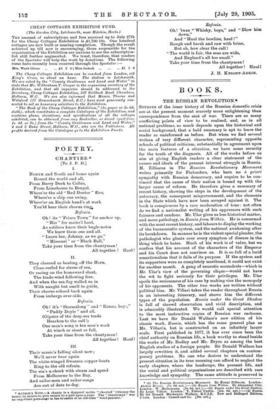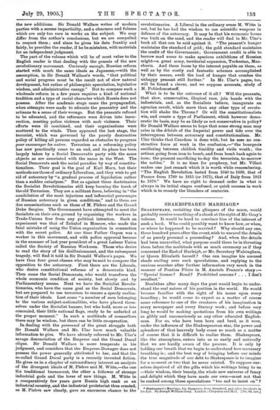STUDIES of the inner history of the Russian domestic crisis
are at the present moment scarcely more enlightening than correspondence from the seat of war. There are so many conflicting points of view to be realised, and, as in all national problems, so much depends upon the historical and social background, that a bald summary is apt to leave the reader as uninformed as before. But when we find several writers of very different character, representing opposite schools of political criticism, substantially in agreement upon the main features of a situation, we have some security for the truth of the diagnosis. All of the works before us aim at giving English readers a clear statement of the causes and ideals of the present internal struggle in Russia. M. Zilliacus in The Russian. Revolutionary Movement writes primarily for Finlanders, who have no a priori sympathy with Russian democracy, and require to be con- vinced that the cause of their nation is bound up with the larger cause of reform. He therefore gives a summary of recent history, showing the steps in the development of the autocracy, the consequent misgovernment, and the elements in the State which have now been arrayed against it. The book is conspicuous by a rare moderation of tone : not often do we find a nationalist writing of his oppressors with such fairness and candour. Mr. Ular gives us less historical matter, and more pathology, in Russia from Within. He is concerned with the most recent history, and labours to display the working of the bureaucratic system, and the national awakening after its breakdown. In manner he is the violent special pleader, the pathologist who gloats over every symptom of disease in the thing which he hates. Much of his work is of value, but we confess that his account of the characters of the Emperor and his Court does not convince us. It is so full of a lurid sensationalism that it fails of its purpose. If the system and its supporters were so completely moribund, it could not exist - for another month. A gang of neurotic scoundrels—which is Mr. Ular's view of the governing clique—would not have the wit to fight seriously for their privileges. Mr. Ular spoils the seriousness of his case by making vice the monopoly of his opponents. The other two works are written without political bias. Mr. Villari takes the reader throughout Russia in an interesting itinerary, and shows him the different types of the population. Russia under the Great Shadow is full of shrewd observation and vivid description, and is admirably illustrated. We would call special attention to the most instructive copies of Russian war cartoons. Last we have Sir Donald Wallace's new edition of his classic work, Russia, which has the same general plan as Mr. Villari's, but is constructed on an infinitely larger scale. First published in 1877, it has ever since been the chief authority on Russian life, a book worthy to stand beside the works of Mr. Bodley and Mr. Bryce as among the best English studies of a foreign people. Sir Donald Wallace has largely rewritten it, and added several chapters on contem- porary problems. No one who desires to understand the present situation in its true meaning can afford to neglect the early chapters, where the landscape, the peasant life, and the social and political organisations are described with rare knowledge and sympathy. The same attitude is preserved in
• (1) The Russian Revolutionary Movement. By Konni Zilliacus. London : Alston Rivers. 17s. 6d. net.]—(2) Russia from Within. By Alexander Mar. London : W. Heinemann. [5s. 6d. net.]—(3) Russia under the Great Shadow. By Luigi Villari. London; T. Fisher Unwin. [Ws. 6d. net. —(4) Russia. By Sir Donald Mackenzie Wallace, IC.C.LE. New and Enlarged Edition. 2 vols. London: Cassell and Co. [248. net.]
the new additions. Sir Donald Wallace writes of modern parties with a serene impartiality, and a clearness and fulness which are only too rare in works on the subject. We may differ from the author's conclusions, but we are compelled to respect them ; and since he gives his data frankly and fairly, be provides the reader, if he be mistaken, with materials for an independent judgment.
The part of the volume which will be of most value to the English reader is that dealing with the genesis of the new revolutionary movement. Curiously enough, Russian reform started with much the same ideals as Japanese,—with the assumption, in Sir Donald Wallace's words, "that political and social progress must be the result not of slow natural development, but rather of philosophic speculation, legislative wisdom, and administrative energy." But to compass such a wholesale reform in a few years requires a kind of national tradition and a type of racial character which Russia does not possess. After the academic stage came the propagandist, when attempts were made to educate the peasantry and the artisans to a sense of their wrongs. But the peasants refused to be educated, and the reformers were driven into insur- rection, meeting police violence with mob violence. Their efforts were ill combined, and their organisations were scattered to the winds. Then appeared the last stage, the terrorist, which was governed by the purely destructive policy of killing all persons regarded as obstacles to progress pour encourager lee autres. Terrorism as a reforming policy has now practically come to an end, and its place has been largely taken by a Social Democratic party with the same objects as are associated with the name in the West. The Social Democrats seek the social paradise by way of constitu- tionalism. Their goal is the goal of Karl Marx, but their methods are those of ordinary Liberalism, and they wish to get rid of autocracy by "a gradual process of liquidation rather than a sudden cataclysm." But as against these doctrinaires the Socialist Revolutionaries still keep burning the torch of the old Terrorism. They are a militant force, believing in "the annihilation of the most injurious and influential personages of Russian autocracy in given conditions," and to them are due assassinations such as those of M. Plehve and the Grand Duke Sergius. The Government have attempted to meet the Socialists on their own ground by organising the workers in Trade-Unions free from any political intention. Such an experiment was that of Zubatof in Moscow, who made the fatal mistake of using the Union organisation in connection with the secret police. At one time Father Gapon was a worker in this movement, and with police approval became in the summer of last year president of a great Labour Union called the Society of Russian Workmen. Those who desire to read the story of his disillusionment, and the subsequent tragedy, will find it told in Sir Donald Wallace's pages. We have thus four great classes who may be said to compose the opposition to the autocracy. First there are the Liberals, who desire constitutional reforms of a democratic kind. Then come the Social Democrats, who would transform the whole economic condition of society, but slowly and by Parliamentary means. Next we have the Socialist Revolu- tionaries, who have the same goal as the Social Democrats, but are prepared to use terrorism to ensure a speedy realisa- tion of their ideals. Last come "a number of men belonging to the various subject-nationalities, who have placed them- selves under the Socialist banner, but who hold, more or less concealed, their little national flags, ready to be unfurled at the proper moment." In such a multitude of counsellors there may be wisdom, but there can be little co-operation.
In dealing with the personnel of the great struggle both Sir Donald Wallace and Mr. tiler have much valuable information to give. We have already referred to Mr. Ular's savage denunciation of the Emperor and the Grand Ducal clique. • Sir Donald Wallace is more temperate in his judgment, and considers that the Empress-Dowager does not possess the power generally attributed to her, and that the so-called Grand Ducal party is a recently invented fiction. He gives us in a chapter of extraordinary interest an analysis of the divergent ideals of M. Plehve and M. Witte,—the one the traditional bureaucrat, the other a follower of strange industrial gods and the lover of new things. M. Witte in a comparatively few years gave Russia high rank as an industrial country, and the industrial proletariat thus created, as M, Plehve saw clearly, gave an enormous ,chance to the revolutionaries. A Liberal in the ordinary sense M. Witte is not, but he has had the wisdom to use scientific weapons in defence of the autocracy. It may be that his economic house was built on the sand, and the reader will find in Mr. Ular's book all that can be said against it. "The peasant's hunger maintains the standard of gold ; the gold standard maintains the credit of the Government; Government credit is able to borrow mad sums to make specious exhibitions of Russian might—a great army, territorial expansion, Turkestan, Man- churia. And these loans by the interest payable on them, as well as by the costly and fantastic schemes accomplished by their means, swell the load of hunger that crushes the unhappy peasant still further." In Mr. Ular's pages, too, will be found a clever, and we suppose accurate, study of M. Pobiedonostzeff.
What is to be the outcome of it all ? Will the peasants, that slow, conservative, illogical race, join hands with the industrials, and, as the Socialists believe, inaugurate an agrarian revolt, which more than any other type of revolu- tion will shake the Throne ? Or will the constitutionalists win, and create a type of Parliament, which however demo- cratic its basis, may be as likely as not conservative in policy P Sir Donald Wallace seems to hope that some strong man may arise in the clgba'cle of the Imperial power and tide over the interregnum between autocracy and constitutionalism. Mr. Ular thinks that Czardom is done with, but he sees no con- structive force at work in the confusion,—" the bourgeois oscillating between childish timidity and virile wrath ; the artisan going from icon to bomb, and from bomb back again to icon ; the peasant sacrificing to-day the terrorists, to-morrow the nobles." It is no time for prophecy, but Mr. Villari makes one just remark which it is worth while remembering. "The English Revolution lasted from 1640 to 1689, that of France from 1789 to 1815 (or 1871), that of Italy from 1821 to 1870." We have no right to demand order in what is always in its initial stages confused, or quick success in work which is to remedy the blunders of centuries.







































 Previous page
Previous page